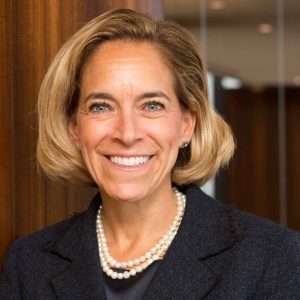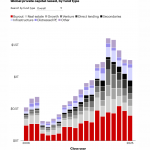How does one of the world’s biggest private equity funds dig out the best people to lead its businesses? Susan Levine, who heads up C-suite hiring for Bain Capital’s portfolio companies, believes finding and hiring extraordinary talent might be the most important thing Bain Capital does.
Bain Capital has long been one of the world’s biggest private equity firms, with a portfolio spanning businesses including Virgin Australia, Canada Goose, Domino’s Pizza, WordPay, Bugaboo and Athenahealth.
The firm was founded in the 1980s to implement Bain & Company’s tried and tested consulting techniques in a private equity setting, in order to improve operational efficiency.
That strategy became widely copied through the decade, and has helped Bain Capital grow to manage about $165bn of capital across PE, VC, credit, public equity, impact investing, life sciences, crypto and tech, among other areas.
But being so large necessitates a strong strategy for finding the very best candidates to lead its portfilio companies – something Bain Capital head of talent Susan Levine believes is critical to the firm’s ongoing success.
So, what is the secret sauce to the firm’s portfolio hiring success?
Levine said that before the firm’s hiring team goes out and builds a pipeline, they make sure that there is a lot of clarity on exactly what they are looking for.
Bain ploughs a lot of time and resources into selection and recruitment of the right candidates, according to Levine. “We have a very rigorous approach globally, and we try to make sure that we execute consistently,” she said.
“We align on what are the “nice to haves “; and what are the “must haves” for the role. We align internally; with our team, with the Board, to make sure we can create the most appropriate and well-defined position description specific to the role,” explained Levine.
“Many firms say: right, we need to hire a CFO, and then just dive in. Then there are a lot of failures. What I’ve found is: if we can get that first spec right and define exactly what we are looking for, we’ve found that is a critical success factor.
“Once we’ve defined that, we hire a search partner, and we educate them on the company and the opportunity – what’s the context of the situation- with our team, and the Board. We want to make sure that the first people making the calls from our search partners are equipped with the talking points and facts about the opportunity.”

She continued: “So we want to prepare them on the investment thesis. Before we interview anyone, a specialist will screen candidates. We have experts for different purposes -so I will do the CEO screening for example, while another finance specialist will do the screening of finance candidates.”
Then Bain Capital does a very important step – blind referencing. The firm contacts references the candidate hasnt provided themselves. “We are looking for independent points of view. People that may not be on the candidate’s reference list. We do let candidates and external search parties know about it, so it is transparent, but it is also very helpful to get independent peer, manager and upward points of view that can be helpful in our decision-making process.”
In terms of interviews from members of the Bain Capital team, the firm makes sure to root out any group think. “Everyone independently gives their ratings,” she explains. “We get all the independent views on a candidate together, and then we aggregate those.”
Another step in the process is a leadership discussion with our leadership assessment partner. Our candidates spend four hours in a leadership discussion to understand strengths, leadership potential, development opportunities and intrinsic factors in terms of the individual’s leadership profile.
So the process comes down to: clarifying the role through a discussion upfront, writing the spec, aligning with the search partner, building pipeline, first round interviews, calibration discussion, referencing, leadership assessment, final round, and then an offer.
In terms of what Levine is looking for in candidates, she says that intrinsic motivators are the most important factors for success. Uncompromising integrity, empathy, drive, high ownership, adjustment and ambition are paramount. “Not ambition as in arrogance, but highly self-confident and also self-aware,” she added.
The most sought-after skills, however, are those that could be called relationship skills. “First and foremost: we’re looking for really strong listening skills and empathy. Number two: were looking for people with high resilience and agility. We’ve all had issues in our lives that we’ve overcome. It’s not about the difficulties you encounter, but how you overcome them. And strong collaboration skills.”
“These are what we call intrinsic drivers; ability to navigate highs and lows. And then there is something which has become increasingly important since Covid; cultivating creative thinking to enable businesses to survive, as well as a high curiosity towards oneself and others.
She reveals that a lot of what drives her personally is learning about the psychology of other people and finding out what makes them tick.
Levine says that she’s not interested in what degree or major someone graduated with. People from a range of backgrounds are considered, especially people with strong problem-solving skills.
When looking at a CV, she looks for demonstrable progression. “I’m looking for a demonstrable progression of success. Someone who has set a strategic direction, and then looked at: what did I do well, what did I not do well? This job is not a sprint, it’s a marathon, and you need to pace yourself for the race every day.”
Copyright © 2023 AltAssets



























